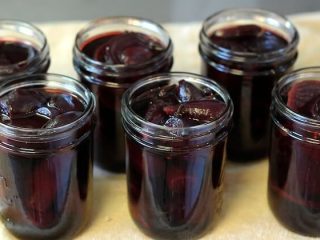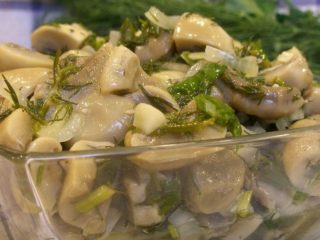Content
After seaming, cucumbers become cloudy in jars - this is a problem that lovers of homemade preparations often face. In order to prevent clouding or to save the brine, you need to know why it loses its transparency.
List of reasons why cucumber jars turn cloudy
The general reason why cucumbers turn cloudy when rolled is always the same - fermentation begins in the brine. Due to the activity of microorganisms, not only the jars of cucumbers become cloudy when salted, the fruits themselves change taste and deteriorate, the lids on the jars with blanks swell.
With proper salting and canning, cucumbers in jars should not ferment. If they become cloudy, this usually indicates a few mistakes.
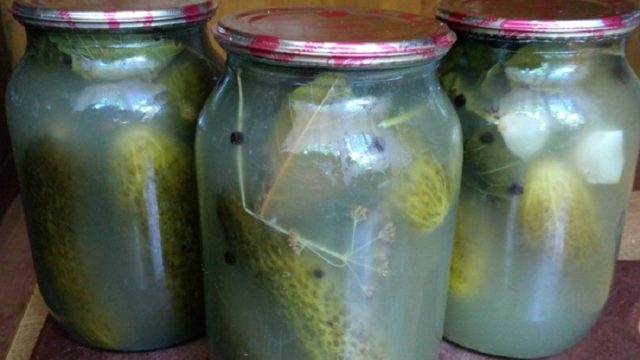
If the workpieces are cloudy, then the fermentation process is underway in the jar.
Why did the cucumbers grow cloudy in the jar immediately after closing?
It is not only those cucumbers that have stood in the jar for many months in a row and have begun to deteriorate. Sometimes the solution becomes opaque almost immediately after rolling the fruit.
This means only one thing - dirt and a large number of microorganisms got into the jar. Most often, the workpieces become cloudy due to poorly washed cucumbers before canning and poorly sterilized cans. It is likely that there are residues of detergent or pieces of food on the walls of the container, unnoticed dirt often accumulates on the neck of the can or under the lid.
Why pickled cucumbers in a jar grow cloudy
When pickling, the fruit also often becomes cloudy, and this can happen for a variety of reasons. In addition to poorly washed and not completely sterilized cans, there are such moments:
- violation of the pickling recipe - incorrect proportions or skipped steps in the process of harvesting vegetables;
- using substandard or unsuitable ingredients, such as using expired vinegar or citric acid instead of vinegar;
- unnoticed damage to the can or lid - chips or cracks on the neck, loose lid fit.
It is important to take only fresh ingredients, not to violate their proportions and not to replace with other ingredients that seem to be similar in action.
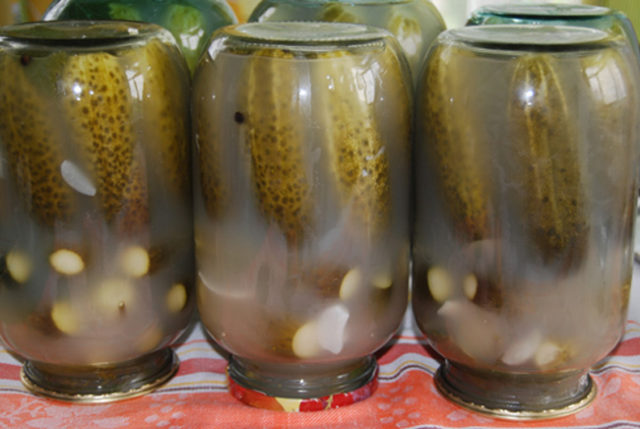
Violation of the selected recipe leads to clouding of the solution in cans
Why do cucumbers turn cloudy in jars when salted
Salting seems to be a very simple procedure, but even after it, jars of cucumbers often turn cloudy and explode. This happens for the following reasons:
- using the wrong cucumbers - not all varieties can be salted, pickled and canned, salad species are not suitable for pickling and quickly become cloudy;
- the use of unsuitable salt - for blanks you can take only universal edible salt, iodized and sea salt are not suitable in this case.
As in other cases, during salting, vegetables also become cloudy due to dirt entering the workpiece or poorly sterilized containers.
Why does the pickle in jars of cucumbers become cloudy?
Sometimes it happens that when all the canning conditions are met, the vegetables remain strong and crunchy, but when pickling cucumbers, the brine becomes cloudy. This can be explained by the following reasons:
- poor-quality water used for salting or canning, if there are excess impurities in it, the solution is expected to become cloudy;
- the presence of nitrates in purchased fruits - after a long stay in the liquid, chemicals leave the pulp of vegetables, but the brine deteriorates;
- unsuitable salt used for pickling or canning, or spoiled vinegar, almost immediately it becomes clear that the pickle in a jar of cucumbers has become cloudy, although the fruits themselves can retain their color and dense structure for some time.
What to do if the brine in pickled and pickled cucumbers becomes cloudy
It is very dangerous to eat spoiled blanks, but if cucumbers in jars that were completely fresh yesterday become cloudy, then in many cases they can be saved. The main thing is to first inspect the cloudy workpiece and make sure that the vegetables have not really lost their quality and deserve resuscitation.
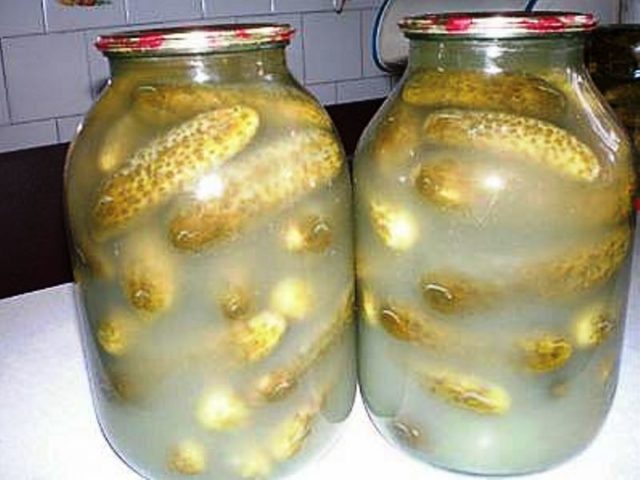
A cloudy workpiece can be redone
How to save cloudy canned cucumbers
If your canned cucumbers are cloudy, you do not need to throw them away. A workpiece that has recently lost its transparency can be saved as follows:
- open the rolled up jars and pour the cloudy solution into the pan;
- pour boiling water into the jars to the vegetables and herbs up to the very neck;
- leave the vegetables in hot water, and at this time put the cloudy saline solution on the fire and boil;
- boil for 5-8 minutes, then add a couple of tablespoons of vinegar to the liquid.
Then the hot water is drained from the jar with fruits, and the treated brine with increased volumes of vinegar is poured back. The cans are rolled up tightly again, while you need to make sure that the workpiece is completely sealed.
What to do if pickles are fermented
Most often, cucumber fruits become cloudy in the jar during the salting process, since preservation occurs without the use of additional ingredients. However, even in this case, pickles can be saved and the fermented milk fermentation can be stopped in the early stages.
If the cucumbers fermented in the jar, but the lid does not swell, then salted vegetables are reanimated as follows:
- the jar is opened and the spoiled brine is poured;
- the fruits are removed and scalded with boiling water in a separate container, and then left in it for 10 minutes;
- a new brine is prepared for vegetables, but this time a little vinegar is added to it, which will serve as a natural preservative;
- vegetables are put back in the jar and poured with fresh saline solution, and then tightly closed.
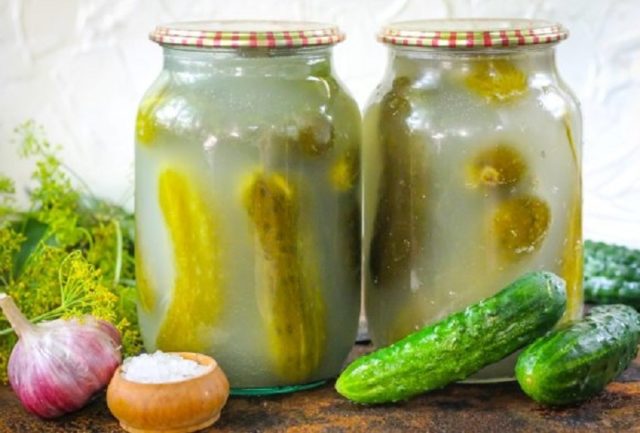
You can save only those blanks on which the lids are not swollen
How to remake cloudy pickled cucumbers
If pickled cucumbers in a jar are cloudy, this usually indicates serious violations in the creation of a blank. Vinegar in the marinade acts as a good preservative, and if the brine becomes cloudy, despite its presence, it means that a lot of microorganisms have got into the jar.
To remake pickled vegetables, you must:
- pour the entire cloudy solution from the jar into the pan and pour the vegetables into a separate container;
- process the fruits with fresh boiling water, which will help kill possible bacteria;
- leave vegetables in hot water, and meanwhile boil the solution in a clean saucepan for at least 5 minutes;
- sterilize the jar and lid thoroughly again.
After that, the fruits are again placed in a container and poured with brine, not forgetting to add a little more fresh vinegar to it. It is necessary to roll up the can a second time especially carefully so that the workpiece is completely sealed.
Can you eat cloudy canned cucumbers?
If the fruits harvested for the winter become cloudy, this does not always mean that they have irrevocably deteriorated. Therefore, many people have a question - is it necessary to pickle and salt vegetables again, or you can even eat them cloudy.
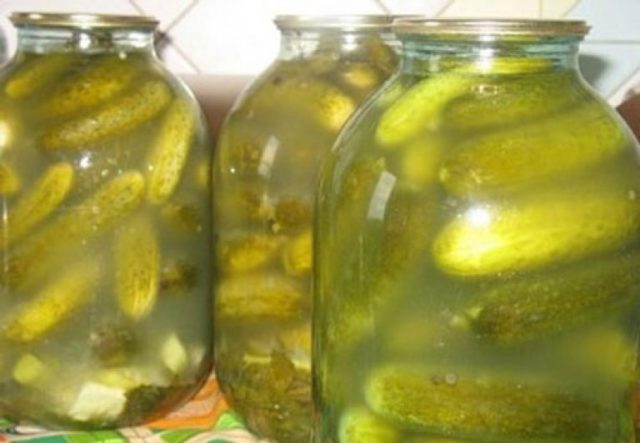
You cannot eat cloudy vegetables - it is dangerous to health.
If the brine in pickled cucumbers has become cloudy, it is strictly not recommended to eat such fruits without processing. Botulism bacteria may be present in the jar, and they pose a huge danger to humans. At best, harvesting will cause an upset stomach, and at worst, it will lead to a serious illness with a potential death.
It must be remembered that when the cucumbers become cloudy, they must be carefully examined before re-pickling or salting. It is allowed to alter the workpiece only if the vegetables have not softened, have not acquired an unpleasant color and aroma, and the lid on the jar with the cloudy brine has not had time to swell. If the vegetables ferment, and the lid swells at the same time, and an unpleasant smell emanates from the workpiece, then the fruits definitely need to be thrown away. Reanimating them is pointless and dangerous - they are no longer suitable for use.
A few tips on how to salt and pickle cucumbers to keep them from cloudy
A few simple recommendations help to safely preserve vegetables:
- It is better to take distilled or spring water for pickling and pickling. Tap water can contain excess impurities even after boiling, and the fruits become cloudy in it more often.
- It is better to salt and preserve products grown on your own plot without the use of chemicals. You only need to pick up special varieties that are small in size, crunchy dense pulp and small hard thorns on the peel.
- Vegetables should be soaked in cold water for several hours before canning. At the same time, not only probable harmful substances will come out of them, but also air from the internal voids, as well as the dirt will be washed off qualitatively - soaked vegetables ferment less often.
When preserving, many housewives add several small tomatoes to the cucumbers. Usually the brine does not ferment after that - tomatoes prevent unwanted processes.
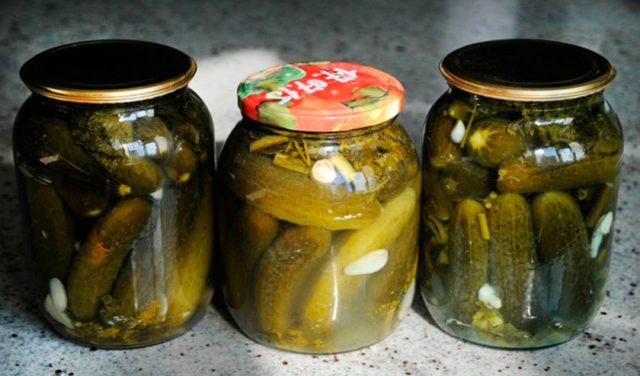
Tomatoes in pickles help prevent clouding
Conclusion
After seaming, cucumbers become cloudy in cans if the canning technology has been violated, or the wrong ingredients were used for the brine. If there is no swelling on the lids of the workpiece, you can try to save it, then you will not have to throw the vegetables away.

